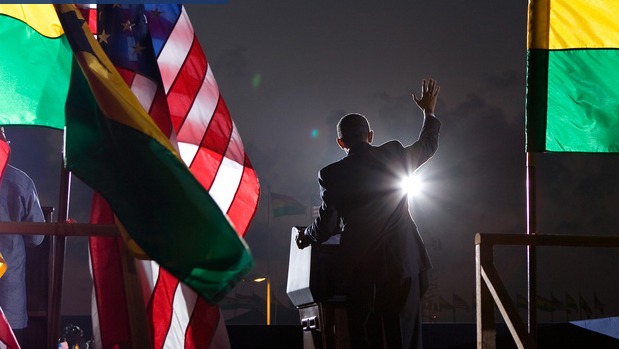Look to Entrepreneurs to Determine if the African Leaders Summit was Indeed a Success
By Dr. Wiebe Boer, CEO, The Tony Elumelu Foundation
The US-Africa Leaders Summit was a remarkable experience for me. I am American, but was born and raised in Nigeria, and as a lifelong student of African history, the depth, the breadth and the focus of the conversations during the Summit impressed me. I left confident that the wave that brought this current crop of African leaders to DC, determined to engage with the rest of the world on equal terms, had solidified into something permanent and tangible; something that could stimulate growth for decades to come.
It was clear that history was being made during each of the Summit’s many events. I sat, humbled, during the largest State Dinner ever at the White House, as 200 of the most powerful Africans and Americans on both sides of the Atlantic — including our founder Mr. Tony Elumelu — discussed how a new approach to the long-term development of the continent could lead to long-term shared prosperity.
Juxtaposed against the subjects of my doctoral studies — the hundreds of years when international engagement with Africa centered on exploitation through the extraction of natural wealth — the Summit’s focus on what could be invested into the continent, rather than taken out, was compelling. Three years ago Mr. Elumelu started a movement called Africapitalism, focused on moving investment in Africa from being characterized by short term extraction to long term value creation instead. And here this exact approach was being discussed, promoted, and ratified at the highest levels.
And given our work at the Tony Elumelu Foundation, I am particularly interested in the impact the Summit will have on Africa’s emerging entrepreneurs, as they are an essential driver of Africa’s future. But too often, in our enthusiasm to embrace large-scale corporate investment, we forget the young people who will create Africa’s next generation of businesses, and who will truly shape the continent’s future.
When we focus on entrepreneurship, we focus on that future.
So it is useful to consider the major topics of the Summit, and the major initiatives currently underway, through the lens of Africa’s entrepreneurs. How will they be affected? Consider the Power Africa Initiative and other efforts aimed at improving infrastructure across the continent. Reliable power generation, transportation networks and refining and processing capacity promise to benefit tens of thousands of businesses and millions of lives. But the most significant long-term impact may be on start-ups, those that would never get off the ground without the proper infrastructure. These African-owned businesses will generate jobs and social wealth. If managed correctly, the Power Africa Initiative can enable entrepreneurs to turn their ideas into businesses, creating economic and social wealth and make Africapitalism a reality. Power Africa shows us that as African entrepreneurs go, so goes Africa.
We can apply the same filter to other programs. Is the renewal of the African Growth and Opportunity Act a positive for the continent? If it drives African entrepreneurship, and offers opportunities for start-ups and SMEs on the continent, the answer is yes. Will emerging African entrepreneurs be able to build businesses around the supply and distribution chains it would bring? Will funding be created and made accessible to young Africans more interested in being employers than employees?
Like many others, I was struck during the Summit by the poise and vision of 21 year-old Zimbabwean entrepreneur Takunda Chingonzo, who challenged President Obama about the negative impact that U.S. sanctions on Zimbabwe are having on that nation’s entrepreneurs. In raising the issue – and in drawing from the President a promise to revisit the policy to consider funding for projects that would advance the country – Mr. Chingozo illustrates perfectly how entrepreneurs can and should engage with policymakers and leaders, both at home and abroad in order to create a climate that is truly favourable to economic development and social wealth.
If the Summit leads to more such conversations, more engagement, more collaboration and more entrepreneurship, then we can surely celebrate its success. And if there is success to be celebrated, then future generations of students of African history will one day write about these events in their doctoral dissertations as the moment that the tide turned and Africapitalism became the approach to global engagement with Africa, and the continent was forever changed for the benefit of all.

